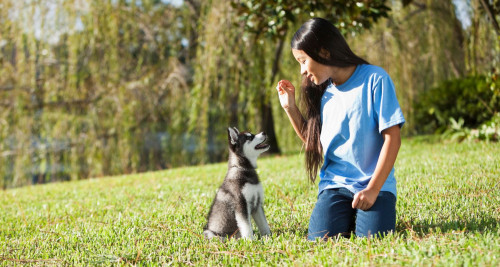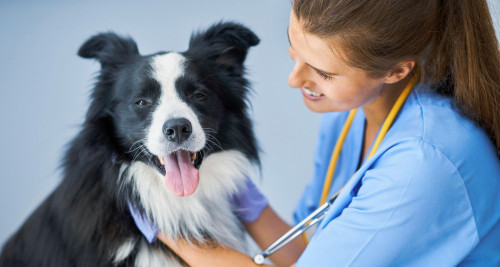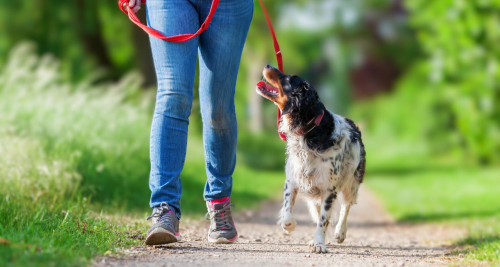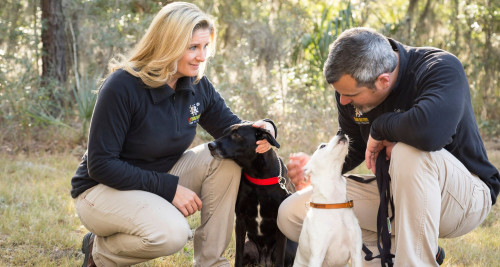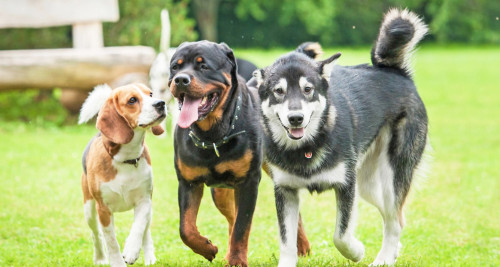Labradoodle
Breed Traits and Characteristics
According to Dogtime.com, here are some breed characteristic you can find in Labradoodles.
- Height
21-24 inches
- Weight
50-65 pounds
- Life Expectancy
12-14 years
- Coat Type/Length
Curly/Medium
-
100 Affectionate with Family
-
80 Good with Young Children
-
100 Good with Other Dogs
-
80 trainability level
-
100 energy level
-
40 barking level
-
60 shedding level
-
20 drooling level
History
The Labradoodle has been bred since 1989, when Wally Conron, an employee at the Royal Guide Dogs Association of Australia, responded to a special request for a non-shedding guide dog from a blind lady living in Hawaii whose husband suffered from allergies. After trial and error, Conron crossed a Labrador – a breed with a proud pedigree and reliably stable temperament – with a Poodle, whose non-shed coat and stable genetics resulted in a perfect match that has steadily risen in popularity, especially in the United States.
Conron, however, has expressed regret about creating the Labradoodle. While he felt that he bred an adorable animal, Conron is concerned about the health of the dogs and the greed of some breeders, who he maintains have not always focused on fostering the good qualities of the breed. While poor breeding practices are not a Labradoodle-specific problem, there are many reputable, ethical Labradoodle breeders who focus on breeding for soundness, health, and temperament.
The Labradoodle
The Labradoodle is perhaps the first “designer dog,” making it a more recent (and extremely popular) addition to the canine kingdom. A cross between the family-friendly Labrador and the good-natured Poodle, the breed is not recognized by the American Kennel Club. The Australian Labradoodle Association of America (ALAA), however, describes them as compact, medium-sized dogs, with an athletic build, high intelligence, a non-shedding coat, and a reliably stable temperament.
Labradoodles are friendly and love people. They also possess a unique ability to gauge the needs of those around them, which the ALAA maintains makes them excellent guide dogs and great for humans with special needs.
Labradoodle Breed Facts
Physical Characteristics
The Labradoodle has some variability to its physical characteristics that reflects its Poodle and Labrador origins. The breed does tend to share certain traits: while there are three size ranges of Labradoodle, they are usually medium-sized and share an athletic gait and non-shedding coat (which can be either fleece or wool). The ALAA specifies a broad, moderately wide skull, large, fleshy muzzle, and flat ears.
The Labradoodle appears to have few genetic faults (the kind that often result from ‘line breeding’ or inbreeding). While breed creator Willy Conron told ABC News that “I find that the biggest majority (of Labradoodles) are either crazy or have a hereditary problem,” John de Jong, a veterinarian in the Boston area and a recent president of the American Veterinary Medical Association, says mixing breeds actually reduces the risk of genetic problems. The ALAA says the breed is “generally considered healthy,” but can have problems with hip and elbow dysplasia.
Personality & Temperament
Labradoodle owners know how lively, energetic, and intelligent they can be. These excellent family dogs aim to please but can become a bit erratic if household members (especially children) are particularly lively. Labradoodles require both regular exercise for their energy levels and an outlet for their intelligence – if not available, they can be over-exuberant and engage in destructive behavior, like chewing. Good management and early, consistent training are vital to avoiding issues before they become entrenched.
Breed Traits
Class
- “Oodles”, or poodle-crosses
Color
- Gold, Black, Cream, Brown, Parti, Tuxedo, Sable, Phantom, Tri-Phantom
Size
- Medium
- Height: 14-16 inches (miniature), 17-20 inches (medium), 21-24 inches (standard
- Weight: 15-65 pounds
Other Traits
- Shaggy coats (Fleece or Wool)
- Long muzzles
Life Expectancy
- The Labradoodle has a life expectancy of 12 to 15 years.
Bark Busters Trainer Jeff Drier on the American Labradoodle
Labradoodles are now one of America’s most popular breeds. Ideal specimens embody the best traits of their parent breeds, Labradors and Poodles: if you get one from a reputable breeder, your Labradoodle most likely will.
Bark Busters trainers work with hundreds (if not thousands) of Labradoodles around the country, and one of the most common issues tends to be hyperactivity and/or overexcitement. This is especially true with families with young children. Like most Labs, Labradoodles can be slow to mature, and being around young children seems to bring out their puppy side even more.
Henry was one of those dogs. His family of five brought him home when he was ten weeks old. He immediately bonded with the kids, aged seven, nine and eleven. He (sort of) listened to Mom or Dad when the kids were out or at school, but once they got home, Henry stopped listening and would get very excited.
Unfortunately, this excitement could be destructive. Henry would jump on the kids, as well as mouth and nip them. What Henry saw as playing was becoming more and more dangerous, to the point that the younger children were becoming a little afraid of Henry. That’s when the family contacted and made an appointment with Sharon, their local Bark Busters trainer. At the time, Henry was just over six months old.
When Sharon arrived for the first meeting, Henry met her at the front door with an exuberant jump. Once she was able to get inside and join everyone around the kitchen table, she listened as the family told her about life with Henry. She asked questions about their daily routine and rules and learned about his behavior. Sharon explained that Henry was only doing what came naturally to him: he was interpreting the family’s behavior as though they were all dogs – his only frame of reference!
Sharon stressed the importance of structure and a proactive education for Henry – just as the children went to school for an education, Henry needed the same. Once Sharon explained how Henry viewed the situations that lead to his overexcitement, she gave the family a plan to teach Henry to relax and to react to instructions when Mom or Dad had enough.
Things got off to a good start – Henry responded nicely to his exercises. Sharon wrote out some homework and scheduled a follow-up appointment a couple of weeks later. She emphasized being proactive, not reactive, with Henry and recommended the family call her with any questions that may arise.
When Sharon returned, she was pleased to hear another positive report: Henry’s behavior had improved in multiple areas, and he was having encouraging interactions with all family members. Henry would occasionally “lose it” and get overexcited, but the instances were less and less frequent. The family felt they had an effective plan in place to teach Henry to be a great family member.
At the second session, Sharon had the family demonstrate the exercises she had taught them at the first session. She gave them lots of positive feedback and made some suggestions for future improvement, as well as introduced a couple of new exercises. The family was pleased with the results and couldn’t wait to continue working with Henry.
If you are struggling with your Labradoodle’s overexcitement, jumping, hyperactivity, or other behavioral problems, contact your local Bark Busters trainer. Our trainers are available both in person and via virtual sessions to help establish a pattern of consistency, resolve any and all issues, and help you nurture a relationship with your Labradoodle built on mutual understanding, trust, respect, and love.
Life with a Labradoodle: Want to learn more about life with a Labradoodle? We’ve got the scoop here.
Training Your Labradoodle
Training Tips for Potential Owners
- Labradoodles have never been known to walk away from a fight, but the generally won’t start one. It is important to socialize them properly from an early age to avoid behavioral issues.
- Despite well-publicized concerns, the Labradoodle has relatively few heath issues if sourced from reputable, long-term breeder with a successful track record.
- Labradoodles need entertainment and structure in their life to provide outlets for their energy and intelligence.
- Labradoodles love games but require supervision during playtime or they can become over-possessive. Balls or puzzle toys that are durable can stimulate a dog’s natural desire to chew and keep them amused.
- Early training is advised to harness the Labradoodle’s ample energy, which can be intimidating to other dogs and frustrating to people. If properly socialized and taught to remain calm, Labradoodles get along well with anyone.
- Aggression is not normally an issue with Labradoodles, though their confidence can lead to leash issues; instances of barking or resource guarding are also fairly common. If your Labradoodle shows signs of aggression, call your local Bark Busters trainer.
- If you are thinking of purchasing a Labradoodle, it is especially important to source from an ethical, responsible breeder who is breeding for not only looks, but health and temperament as well. Rescues are also great options for prospective Labradoodle owners. Contact your local Bark Busters trainer today to learn about great breeders and rescue organizations near you!
- All dogs need a special place to call their own. By selecting a place for yours to eat and sleep away from high traffic areas of your home, you can set good habits early in its life.
- Prevention is far more preferable to a cure – early basic obedience training is absolutely vital to ensuring your Labradoodle understands and follows your rules.
We are standing by to help you develop a consistent, compassionate approach to good behavior for your Labradoodle. Learn more about our services and schedule an in-person or virtual appointment with one of our trainers today!
Connect with Us!
Need help training your Labradoodle? Call 1-877-500-BARK (2275)or enter your zip code.
Labradoodle Grooming
Labradoodles do not shed their coats, which makes them desirable indoor family pets, especially among allergy sufferers. The ALAA, however, does recommend regular grooming to prevent tangling or matting. The official breed standard suggests their coats should not exceed four inches in length over the entire body.
Tips for Every Dog Owner
Hear from Bark Busters Clients Who Have a Labradoodle
Need Dog Training Assistance with Your Labradoodle? Find Your Local Trainer Now!
CALL TODAY 1-877-500-BARK (2275)
